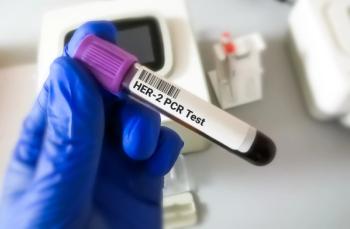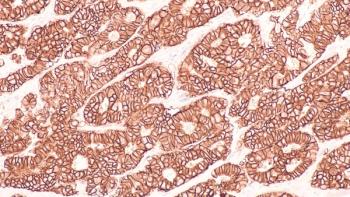
Imlunestrant is an investigational, brain-penetrating, oral selective degrader of estrogen receptor.

Imlunestrant is an investigational, brain-penetrating, oral selective degrader of estrogen receptor.

Julia Ziegengeist, PharmD, BCOP offers insights for pharmacists navigating adjuvant and neoadjuvant treatment of breast cancer.

The predictive tool may reveal the mechanisms underlying treatment resistance in patients with HER+ breast cancer.

The findings extend prior data underscoring the clinical benefit of the agent and its place in global clinical practice guidelines.

Vepdegestrant is an experimental oral PROteolysis TArgeting Chimera that degrades estrogen receptor (ER) in patients with metastatic breast cancer.

Camizestrant is an investigational oral selective estrogen receptor degrader.

Patients achieved an overall survival of 12.4 months.

Tanshinlactone is an active ingredient that is commonly used in Chinese herbal medicine.

T-DXd has a boxed warning for interstitial lung disease and pneumonitis.

Presence of leptomeningeal disease is associated with poorer treatment outcomes and quality of life for patients with breast cancer.

In the study, 50% of the deaths amongst patients were linked to central nervous system-related causes.

The diagnostic identifies patients who may be eligible for treatment with fam-trastuzumab-deruxtecan-nxki (Enhertu; Daiichi-Sankyo, AstraZeneca).

Continuous dosing of ribociclib was associated with better tolerability and outcomes.

Cyclin-dependent kinase 4/6 (CDK 4/6) inhibitors have transformed the treatment of hormone receptor-positive/HER2-negative breast cancer across metastatic and early-stage settings, with ongoing research exploring their potential in additional breast cancer subtypes, combination therapies, and aggressive disease scenarios.

The overall survival data were immature at the primary analysis of the study.

Endocrine therapy in combination with CDK4/6 inhibitors improves patients’ outcomes, but many still become treatment resistant.

The antibody-drug conjugate shows efficacy in reducing disease progression risk and increasing progression-free survival in patients with HR+, HER2-low, or HER2-ultralow metastatic breast cancer.

Tucatinib is an oral HER2-targeting tyrosine kinase inhibitor that was approved by the FDA in 2020.

Rates of invasive breast cancer or death were 50% lower with adjuvant trastuzumab emtansine compared with trastuzumab alone.

Endocrine-immune-based therapies yielded favorable objective response rates but had limited impact on pathological complete response.

These data suggest the potential efficacy of immune checkpoint inhibitors with anthracycline-based chemotherapy.

The FDA is modernizing its approach to drug development and optimization.

A panel of experts discuss treatment of HR+, HER2– breast cancer with therapies such as ribociclib, alpelisib, everolimus, and elacestrant.

KN026 is a humanized bispecific antibody that targets and binds to HER2 proteins on the surface of cancer cells.

Palbociclib is an oral CDK4/6 inhibitor that was approved by the FDA in 2017.